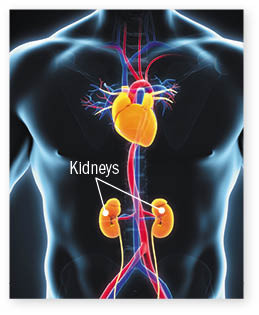A new tool to predict heart disease risk
The PREVENT equation — which takes kidney and metabolic health into account — estimates a person's risk of heart disease over the next 30 years.
- Reviewed by Christopher P. Cannon, MD, Editor in Chief, Harvard Heart Letter; Editorial Advisory Board Member, Harvard Health Publishing
 In January, the American Heart Association (AHA) released a new online calculator to predict a person's odds of developing heart disease; see professional.heart.org/prevent. Compared to previous calculators, the updated tool considers broader measures of health and a longer horizon of risk. The goal? To encourage earlier, more targeted strategies to help people avoid cardiovascular problems.
In January, the American Heart Association (AHA) released a new online calculator to predict a person's odds of developing heart disease; see professional.heart.org/prevent. Compared to previous calculators, the updated tool considers broader measures of health and a longer horizon of risk. The goal? To encourage earlier, more targeted strategies to help people avoid cardiovascular problems.
The PREVENT equation (its name is based on the phrase "predicting risk of cardiovascular disease events") was designed to capture an accurate picture of the American population. Researchers created and validated the model using data from more than 6.6 million adults in the United States from a variety of ethnic, racial, socioeconomic, and geographic backgrounds.
"It's a big step forward, particularly in terms of appreciating the role of kidney and metabolic health in cardiovascular disease," says Dr. Mark Benson, director of preventive cardiology at Harvard-affiliated Beth Israel Deaconess Hospital. The older, 2013 ASCVD risk calculator (health.harvard.edu/heartrisk) considers a person's age, sex, race, smoking status, and presence of diabetes. But the only clinical values considered in the calculation are blood pressure and cholesterol.
What's new?
The PREVENT calculator includes body mass index and another clinical value: estimated glomerular filtration rate (eGFR), which gauges kidney function based on blood levels of creatinine (a waste product filtered by the kidneys) along with age and gender. A normal value is 90 and above.
In a recent advisory, the AHA also highlighted several other biomarkers for cardiovascular-kidney-metabolic (CKM) syndrome (see box below), including
- Urine albumin-to-creatinine ratio (UACR), which detects very small amounts of a protein called albumin in the urine. A normal value is 30 milligrams per gram or lower.
- Hemoglobin A1c (HbA1c), which is a three-month average measure of blood sugar. A normal value is 5.6% or below.
Cardiovascular-kidney-metabolic (CKM) syndromeA recent presidential advisory from the American Heart Association outlined four stages of CKM syndrome. The new PREVENT heart disease risk calculator includes biomarkers related to these stages to better define a person's risk. Stage 0: None of the following risk factors. Stage 1: Excess body fat or abdominal fat or prediabetes (defined as an HbA1c of 5.7% to 6.4% or fasting blood glucose of 100 to 125 mg/dL). Stage 2: Type 2 diabetes, high blood pressure, high triglycerides, or kidney disease. Stage 3: Stage 2 plus early cardiovascular disease (or a high risk of cardiovascular disease). Stage 4: Stage 2 plus symptoms of cardiovascular disease (such as a heart attack, stroke, or heart failure). Stage 4 is further divided into Stage 4a (without kidney failure) or Stage 4b (with kidney failure). |
New treatment options
The blood test most people get at routine health care visits (called a basic metabolic panel) includes the information needed to calculate eGFR, which is used to diagnose and determine the severity of kidney disease, says Dr. Benson. While doctors have known for decades that the risk of cardiovascular disease rises as kidney function drops, there weren't effective therapies to address the problem. "Now, we have several new medications that can improve kidney health and lower cardiovascular risk," says Dr. Benson.
These include SGLT-2 inhibitors, which were originally developed to treat diabetes. The drugs promote weight loss, lower blood pressure, and help prevent kidney damage even in people who do not have diabetes. SGLT-2s such as dapagliflozin (Farxiga) and empagliflozin (Jardiance) also have cardiovascular benefits, especially in people with heart failure. Another class of diabetes drugs, known as GLP-1s, promote even more dramatic weight loss. The best known of these, semaglutide (Ozempic), also lowers the risk of cardiovascular problems, even in people without diabetes. Finally, another medication, finerenone (Kerendia), also helps slow the progression of diabetic kidney disease and prevents heart-related complications.
Reducing risk
The progression toward cardiovascular disease starts early in life, and people often accumulate risks in a stepwise fashion, says Dr. Benson. The PREVENT calculator evaluates people's risk starting at age 30 — a decade earlier than the older calculator. "What's important to recognize is that you can improve your score by addressing known risk factors on the CKM scale," Dr. Benson says. Losing weight (if needed) and keeping your blood pressure and cholesterol in a healthy range is a good start. But be sure to monitor your HbA1c and eGFR as well.
Image: © Nerthuz/Getty Images
About the Author

Julie Corliss, Executive Editor, Harvard Heart Letter
About the Reviewer

Christopher P. Cannon, MD, Editor in Chief, Harvard Heart Letter; Editorial Advisory Board Member, Harvard Health Publishing
Disclaimer:
As a service to our readers, Harvard Health Publishing provides access to our library of archived content. Please note the date of last review or update on all articles.
No content on this site, regardless of date, should ever be used as a substitute for direct medical advice from your doctor or other qualified clinician.













